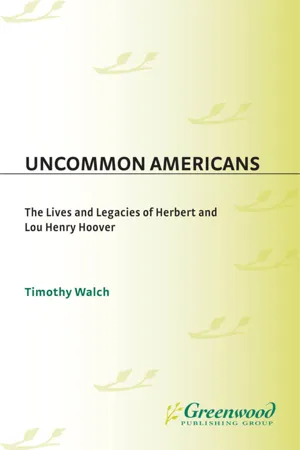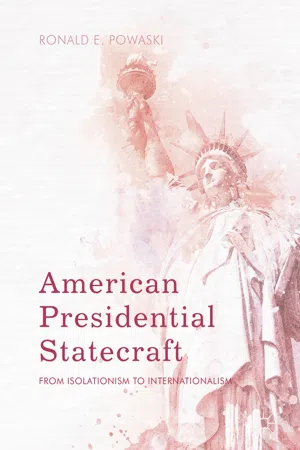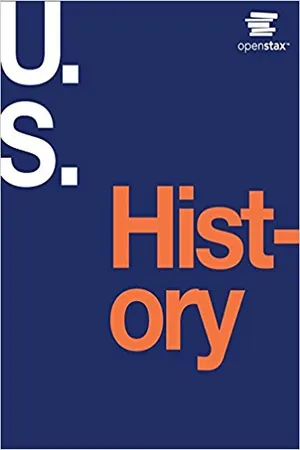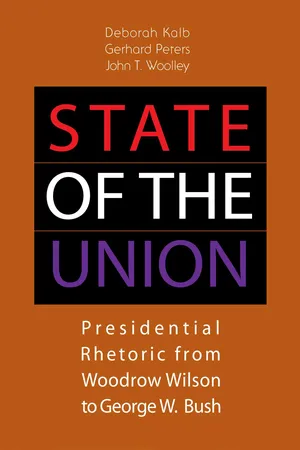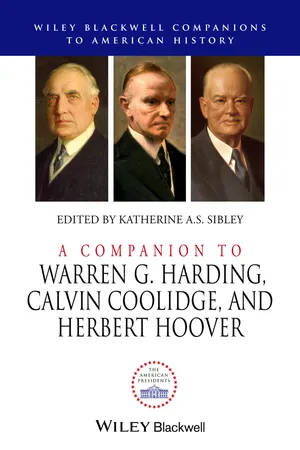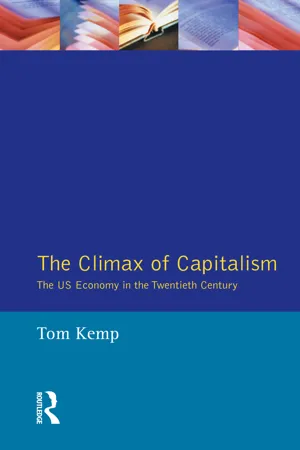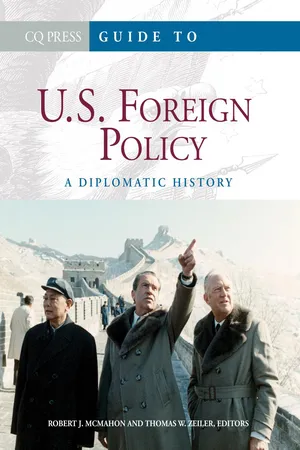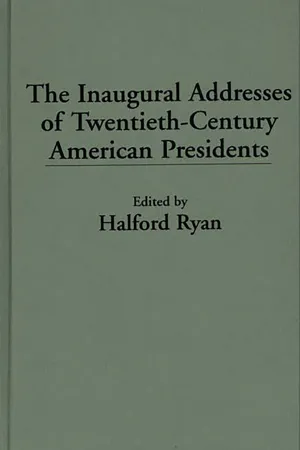History
Hoover Administration
The Hoover Administration refers to the presidency of Herbert Hoover, who served from 1929 to 1933. It is often associated with the Great Depression, as Hoover struggled to address the economic crisis. His administration implemented various relief measures, but these efforts were largely seen as ineffective, leading to widespread suffering and hardship for many Americans.
Written by Perlego with AI-assistance
Related key terms
1 of 5
8 Key excerpts on "Hoover Administration"
- eBook - PDF
Uncommon Americans
The Lives and Legacies of Herbert and Lou Henry Hoover
- Timothy Walch(Author)
- 2003(Publication Date)
- Praeger(Publisher)
In short, the passions surrounding Hoover died down, and the revival faded as fast at it emerged. The high school and college history books have remained unchanged. Seven decades removed from the Hoover presidency, nearly a generation after the collapse of the New Deal coalition, America's political traditions are still clouded by a faulty understanding of Hoover and his ideas. Our often-incoherent ideological traditions have taken shape, in large part, out of decades of misunderstandings of Hoover's place in the history modern America. It is only with a clearer sense of Hoover's legacy that Americans can begin to think straight about politics and public life in our own time. First, it is important to underscore the sheer immensity of the Great Depression. The scale of human misery—in America and abroad—was unprecedented. In rural America and in the big cities alike, all Americans experienced the economic and social dislocations of the late 1920s and 1930s. As a result, millions of Americans saw their most fundamental be- liefs shaken. A generalized sense of being at a loss characterized the United States in the decade beginning in late 1929. While this might strike most Americans as common sense, the history books make it seem as if Herbert Hoover alone was suffering through the Depression, that Hoover alone was confused. In short, the Depression is interpreted as Hoover's personal failure. 422 To grasp more clearly Hoover's experience in the early years of the Great Depression, we must be more alert to the broad sense of cultural disloca- tion in the country at that time. One need only read the pages of the Wall Street Journal or Time magazine to get a sense of the general inability of educated Americans to make sense of the catastrophe. In late 1929, the American Economic Association predicted a speedy and sustained recov- ery from the "temporary" market downturn. - eBook - PDF
American Presidential Statecraft
From Isolationism to Internationalism
- Ronald E. Powaski(Author)
- 2017(Publication Date)
- Palgrave Macmillan(Publisher)
113 © The Author(s) 2017 R.E. Powaski, American Presidential Statecraft, DOI 10.1007/978-3-319-50457-5_4 CHAPTER 4 Herbert Hoover, Henry Stimson, and the Collapse of the Post-World War I International Order, 1921–1933 Herbert Hoover was arguably the most significant political figure during the Republican administrations between 1921 and 1933, first as secretary of commerce then as president of the United States. Along with the presidents under whom he served as secretary of commerce, Warren G. Harding and Calvin Coolidge, Hoover thought the United States had entered a new era of peace and prosperity during the 1920s. Yet by the time Hoover left office, after serving only one term in the presidency, prosperity was only a memory, and Europe’s peace was threatened the advent to power in Germany of Adolf Hitler and Japan’s conquest of China’s Manchurian provinces. What went wrong? Why did the structure of international relations cre- ated after World War I fail to preserve peace and prosperity? To what extent was Herbert Hoover responsible for this failure? What are the limits of a statesman’s ability to influence events? 114 WHO WAS HERBERT HOOVER? Herbert Clark Hoover, historian Robert Ferrell has observed, “was one of the most learned and capable men ever to rise to the presidency. In sheer mental power, in administrative ability, the thirty-first president of the United States has had few equals.” Today, few scholars would argue with Ferrell that Hoover “had the makings of a superb president,” and likely would have been one had it not been for the Great Depression, an event which, given the economic knowledge of his day, was largely beyond his control. 1 Hoover was born in West Branch, Iowa, on August 10, 1874. He was the son of a blacksmith of German descent, Jesse Clark Hoover, and a Canadian-born, Scots-Irish mother, Huldah Minthorn Hoover. - eBook - PDF
- P. Scott Corbett, Volker Janssen, John M. Lund, Todd Pfannestiel, Paul Vickery, Sylvie Waskiewicz(Authors)
- 2014(Publication Date)
- Openstax(Publisher)
Hoover, like many others at the time, thought and hoped that the country would right itself with limited government intervention. This was not the case, however, and millions of Americans sank into grinding poverty. Figure 25.2 (credit "courthouse": modification of work by National Oceanic and Atmospheric Administration) 724 Chapter 25 | Brother, Can You Spare a Dime? The Great Depression, 1929-1932 This OpenStax book is available for free at https://cnx.org/content/col11740/1.3 THE EARLY DAYS OF HOOVER’S PRESIDENCY Upon his inauguration, President Hoover set forth an agenda that he hoped would continue the “Coolidge prosperity” of the previous administration. While accepting the Republican Party’s presidential nomination in 1928, Hoover commented, “Given the chance to go forward with the policies of the last eight years, we shall soon with the help of God be in sight of the day when poverty will be banished from this nation forever.” In the spirit of normalcy that defined the Republican ascendancy of the 1920s, Hoover planned to immediately overhaul federal regulations with the intention of allowing the nation’s economy to grow unfettered by any controls. The role of the government, he contended, should be to create a partnership with the American people, in which the latter would rise (or fall) on their own merits and abilities. He felt the less government intervention in their lives, the better. Yet, to listen to Hoover’s later reflections on Franklin Roosevelt’s first term in office, one could easily mistake his vision for America for the one held by his successor. Speaking in 1936 before an audience in Denver, Colorado, he acknowledged that it was always his intent as president to ensure “a nation built of home owners and farm owners. We want to see more and more of them insured against death and accident, unemployment and old age,” he declared. “We want them all secure.” [1] Such humanitarianism was not uncommon to Hoover. - eBook - PDF
State of the Union
Presidential Rhetoric from Woodrow Wilson to George W. Bush
- Deborah Kalb, Gerhard Peters, John T. Woolley(Authors)
- 2006(Publication Date)
- CQ Press(Publisher)
and unemployed. The president expounded upon methods by which the govern-ment encouraged various voluntary cooperation measures, including efforts to keep wages intact, retain as many employees as possible, and provide construction jobs. Another mantra for Hoover, as it had been for his predecessor, Calvin Coolidge, was a balanced budget. Hoover noted that the Great Depression had negatively affected the federal budget by turning a projected surplus into a deficit. Republicans had effective control over the federal government in the 1920s, with Republicans residing in the White House and maintaining majorities in both houses of Congress, but this was starting to change. Just weeks before this message was delivered, Democrats won control of the House of Representatives in the 1930 midterm elections. This change would become complete two years later, when the Democrats would also win both the White House and the Senate, effectively repu-diating Hoover and his management of the Great Depression. T o the Senate and House of Representatives: I have the honor to comply with the requirement of the Constitution that I should lay before the Congress information as to the state of the Union, and recommend con-sideration of such measures as are necessary and expedient. Substantial progress has been made during the year in national peace and security; the fundamental strength of the Nation’s economic life is unimpaired; education and scientific discovery have made advances; our country is more alive to its problems of moral and spiritual welfare. Economic Situation During the past 12 months we have suffered with other Nations from economic depression. The origins of this depression lie to some extent within our own borders through a speculative period which diverted capital and energy into speculation rather than constructive enterprise. - Katherine A.S. Sibley(Author)
- 2014(Publication Date)
- Wiley-Blackwell(Publisher)
Perhaps even more significantly – and this is where Hoover’s relatively modern outlook was not quite modern enough – he seems to have assumed that the nation’s corporate leaders, selfishness aside, had sufficient tools with which to rebuild capitalist prosperity. Yet no amount of cajoling corporate leaders to act in the public good would have mattered as modern industrial capitalism went through its greatest crisis – before emerging a very different beast. The era of state-sponsored prosperity was just around the corner, and although Hoover glimpsed this dramatic transformation, he did not grab hold of it. He can hardly be faulted for this lack of vision; after all, during his first term, President Franklin Roosevelt failed to understand the transformation as well. But Roosevelt at least tackled the problems of agriculture and banking head on. When the chips were down, the Hoover who had built his reputation as an experimental progressive shrank into the Hoover who wrapped himself in the mantle of economic orthodoxy and eschewed bold policymaking.As this volume has chronicled already, most historians summarily dismissed Hoover during the three decades following his presidency. In their telling, Hoover’s claims in his Memoirs that he set out to “use the powers of government to cushion” the blows of the Great Depression (Hoover 1952: 31) were merely whitewashing. In 1948, the preeminent historian Richard Hofstadter wrote of Hoover that “No President … has ever been seduced by his convictions into blunter defiance of majority opinion” (Hofstadter 1948: 373). In 1957, Arthur Schlesinger, Jr., soon to be President John F. Kennedy’s historian-in-residence, wrote that Hoover’s tragedy was that of “a man of high ideals whose intelligence froze into inflexibility and whose dedication was smitten by self-righteousness” (Schlesinger 1957: 247). To be sure, these early works were not blindly anti-Hoover. Harris Gaylord Warren’s Herbert Hoover and the Great Depression- eBook - ePub
The Climax of Capitalism
The U.S. Economy in the Twentieth Century
- Tom Kemp(Author)
- 2014(Publication Date)
- Routledge(Publisher)
One result of the general fall in prices and a lower cost of living was that consumption fell less than income and output. Indeed, some people might have been better off than before; but they were a minority. The general fall in income meant a disproportionate fall in the demand for house space (as housing figures show) and for durables.Hoover's Response
The Republican administration headed by Herbert Hoover was very much a product of the optimistic 1920s; it now had to handle a situation as intractable as it was unforeseen. Hoover was a man of moderation; a friend of business and a believer in market forces, he did not want to see either organized business or the state become too powerful. A competent administrator, his deep belief in the virtues of capitalism conditioned his initial response to the depression. Thus the budget had to be balanced and financial orthodoxy maintained; not the state, but rather business itself, could fight the depression. The administration had to assist it by building confidence, not by intervention in the market. The essence of his policy was belief in the self-righting mechanism of free market forces.Hoover could not be accused of inactivity in the early stages; he saw his role as boosting business morale and preventing anything which might aggravate the decline. He called on business to maintain employment and avoid wage-cutting, but he did not resist the growing protectionist reaction, especially among farmers, approving the Hawley-Smoot tariff in June 1930, against his better judgement, in the face of impending Congressional elections. The result was the opposite of that sought; retaliatory tariffs by other countries hastened the decline of American exports, aggravating the depression.As time went on, Hoover had to authorize rescue operations which required a certain amount of state intervention and expenditure, but he doggedly resisted proposals for large-scale public works or relief for the unemployed. Veterans of the First World War who gathered in Washington to demand bonus payments in advance of the due date met with a stony reception and were finally dispersed by the military. - eBook - PDF
Guide to U.S. Foreign Policy
A Diplomatic History
- Robert J. McMahon, Thomas W. Zeiler, Robert J. McMahon, Thomas W. Zeiler(Authors)
- 2012(Publication Date)
- CQ Press(Publisher)
Not only did foreign events seem more remote, but they also seemed less urgent. 1 In addition to shifting attention inward, the Depression shaped the reac-tion of Americans and their government to international developments and crises, such as the rearmament of Nazi Germany in the 1930s, the Japanese invasion of Man-churia in 1931, and the Italian invasion of Ethiopia in 1935. Understanding the impact of domestic priorities and economic pressures is essential to explaining American for-eign policy in a volatile era that ended with World War II (1939–1945). U.S. foreign economic policies also were used to communicate the American stance on global crises. After 1937, President Roosevelt favored American intervention in international relations that were marked by hostility, mis-trust, and territorial expansion. He used economic policies and instruments—such as trade embargoes, freezing of foreign assets, and loans—to signal America’s drift away from isolation, neutrality, and unilateralism in favor of intervention and internationalism. HERBERT HOOVER AND THE ONSET OF THE GREAT DEPRESSION Herbert Hoover handily won the 1928 presidential election with a campaign projecting a prosperous future for the United States. He moved swiftly after his inauguration to address long-standing problems affecting agriculture; Congress passed the Agricultural Marketing Act of 1929 in an emergency session. Confidence in Hoover soared. New signs of economic malaise, however, quickly undercut the uplifting start to his presidency. The stock market crash of October 29, 1929, so-called Black Tuesday, was widely recognized after the fact as a sign of serious economic problems. The impact of the economic downturn began to be felt by Americans by the end of 1930. Unemploy-ment jumped from 3.2 percent in 1929 to 8.7 percent one year later. Much worse was to come: at its peak in 1933, unemploy-ment reached a staggering 24.9 percent. - Halford Ryan, Halford Ryan, Halford R. Ryan(Authors)
- 1993(Publication Date)
- Praeger(Publisher)
Fausold, The Presidency of Herbert C. Hoover (Lawrence: University Press of Kansas, 1985), 24, 29; Robert Sobel, Herbert Hoover and the Onset of the Great Depression, 1929-1930 (Philadelphia: J. B. Lip- pincott Company, 1975), 20; Robinson and Bornet, Herbert Hoover, 19. 6. Fausold, Presidency of Hoover, 30; Sobel, Herbert Hoover, 21; Burner, Herbert Hoover, 207. 7. Craig Lloyd, Aggressive Introvert (Columbus: Ohio State University Press, 1972), 153, 186; Harris Gaylord Warren, Herbert Hoover and the Great Depression (New York: Oxford University Press, 1959), 3-4; Fausold, Presidency of Hoover, 22, 24. See, for example, New York Herald Tribune, August 12, 1928; Chicago Daily Tribune, August 13, 1928; Kansas City Times, August 13, 1928. All of the news- paper references in this chapter were taken from files of the Herbert Hoover Presidential Library, West Branch, Iowa. 8. Warren, Herbert Hoover, 3, 6; Robinson and Bornet, Herbert Hoover, 15, 20, 21, 24, 37; Smith, Uncommon Man, 106; Hinshaw, Herbert Hoover, 167; Burner, Herbert Hoover, 207. See Nezv York Times, February 17, March 3, 6,1929; Washington (Iowa) Democrat-Independent, February 21, 1929; Burlingame (California) Advance Star, March 4, 1929; Washington Star, March 2, 6, 1929; Washington Times, March 4, 5, 1929; San Francisco Recorder, March 5, 1929; Florida Times Union, March 6, 1929. 9. Fausold, Presidency of Hoover, 39; Robinson and Bornet, Herbert Hoover, 30; Washington Herald, March 5, 1929; San Francisco Chronicle, March 5, 1929. 92 INAUGURAL ADDRESSES 10. Washington Post, March 5, 1929. My assessment of Hoover's delivery is based partially on audio and visual recordings of excerpts of the 1929 inaugural. This resource can be found in the Herbert Hoover Presidential Library. 11. Robinson and Bornet, Herbert Hoover, 30-31. 12. Herbert Hoover, "Inaugural Address," in Public Papers, 1-12. All subse- quent references to Hoover's inaugural come from this source.
Index pages curate the most relevant extracts from our library of academic textbooks. They’ve been created using an in-house natural language model (NLM), each adding context and meaning to key research topics.
